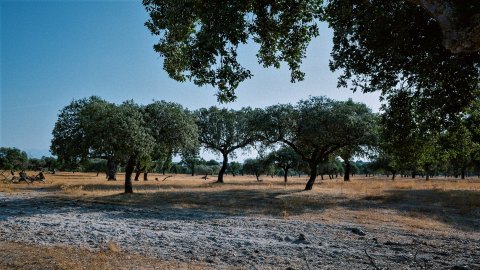A recent study, carried out by researchers from the Universities of Göttingen and Kassel, gives insights to experts’ opinions on the potential of product labelling from agroforestry and has just been published in the journal "Sustainability Science".
Since the environmental circumstances of food production have become a political issue for some time already and consumers want to make better-informed purchasing decisions, the question arises, which information is necessary, helpful and transparent to promote criteria of sustainability in food products. Various food labels try to fill this gap by labelling and promoting different quality, origin or environmental traits. Especially for agroforestry systems, the sustainable and resilient characteristics could be highlighted more prominent for related products than they are today.
The Mediterranean region was put in focus because of its diverse, widespread, and culturally important types of food, coming from agroforestry. Therefore, Lukas Flinzberger, Yves Zinngrebe and Tobias Plieninger invited more than 20 agroforestry and labelling experts to a three-round Delphi study to evaluate chances and barriers for labelling of Mediterranean agroforestry products, considering the UN-Sustainable Development Goals.
Out of 15 evaluated sustainability indicators, the authors recommend four in particular, which are distinguished by good comprehensibility and applicability: "Salaries for employees", "No use of chemical fertilizers or pesticides", the "Use of landscape elements for product marketing", and "Areas for natural vegetation". These indicators cover a broad sustainability spectrum in an understandable way and are therefore proposed as "umbrella" indicators. From a marketing point of view, agroforestry systems have a central problem: the term is too little known.
So far, agroforestry has not been sufficiently promoted within the framework of the European Agricultural Policy and until the support mechanisms are fully adapted to sustainable production, the economic viability of existing agroforestry systems must be ensured. The study reveals, that some core indicators can communicate important sustainability aspects to consumers and support their purchasing decisions.
To guarantee sustainability in line with the UN goals, different types of certification appear to be particularly suitable in the agroforestry context. Beside existing certification as done by eco, fair trade, or geographic labels, a hypothetical new agroforestry label is being called for in expert circles as a desirable instrument. On the downside, it could suffer from the unfamiliarity of the term and the great diversity of different agroforestry systems. A labelling approach based on the existing EU system of geographical indications of origin and the SDGs, on the other hand, was assessed as promising by several experts.
On this basis, the authors recommend more in-depth research on the potential of combined agroforestry and geographic labelling. The system of geographically protected indications of source established at EU level appears to be the obvious entry point. This study is part of the DFG-funded “LandscapeChains” project and thus contributes to the Programme on Ecosystem Change and Society and the Global Land Programme.












